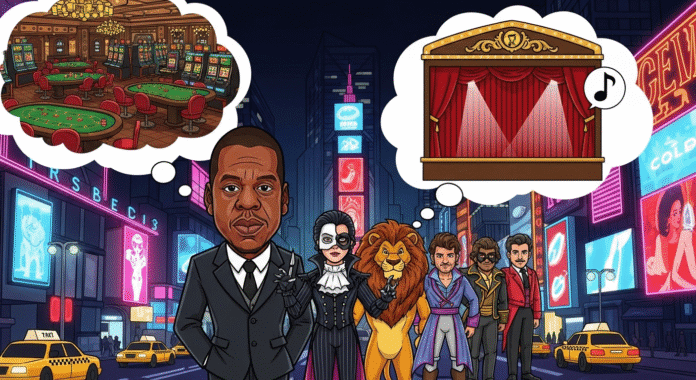The Great White Way Stands Its Ground Against Gaming Giants
The bright lights of Broadway have successfully dimmed Jay-Z’s casino ambitions in Times Square. The hip-hop mogul’s partnership with Caesars Entertainment to transform an office building into Caesars Palace Times Square has hit a dead end, with New York City officials rejecting the high-stakes proposal amid fierce opposition from the theater district’s most powerful voices.
This isn’t just another business deal gone wrong – it’s a clash between two entertainment titans over the soul of America’s most famous intersection. The rejection of what would have been a $23.3 billion gambling revenue generator over ten years highlights the ongoing tension between traditional Broadway culture and the expanding gaming industry’s push into urban centers.
The Proposal That Promised Billions
The ambitious plan would have converted a nondescript office building into a glittering casino complex bearing the Caesars Palace name. With Jay-Z’s star power and Caesars’ gaming expertise behind it, the proposal projected massive financial returns and promised to create thousands of jobs in the heart of Manhattan.
Key Financial Projections:
- $23.3 billion in gambling revenue over 10 years
- Hundreds of direct employment opportunities
- Significant tax revenue for New York City
- Economic stimulus for the surrounding area
The numbers were undeniably impressive, painting a picture of economic prosperity that supporters argued would benefit the entire city. Proponents emphasized the project’s potential to enhance safety in the area through increased security presence and foot traffic, while creating legitimate employment opportunities in the entertainment sector.
Broadway’s Battle Cry
However, the theater district’s established community wasn’t buying into the casino vision. Broadway groups mobilized with the kind of coordination typically reserved for Tony Award campaigns, presenting a united front against what they viewed as a threat to their cultural ecosystem.
Primary Concerns Raised:
- Increased crime in the theater district
- Sanitation issues from expanded foot traffic
- Traffic congestion during peak theater hours
- Potential negative impact on family-friendly Broadway atmosphere
Local community organizations joined the Broadway coalition, arguing that a casino would fundamentally alter the character of Times Square. These groups worried that gambling addiction issues and associated social problems would undermine the area’s reputation as a safe entertainment destination for families and tourists.
The Politics of Place
The rejection reflects deeper questions about what Times Square should represent in the 21st century. Once known as a gritty, dangerous area, the district underwent massive revitalization in the 1990s and 2000s, transforming into a sanitized tourist destination anchored by Broadway theaters, chain restaurants, and family entertainment.
Casino supporters argued that their proposal represented the next evolution of this transformation – bringing sophisticated gaming entertainment to match the district’s status as a world-class destination. They pointed to successful casino integrations in other major cities as evidence that gambling and traditional entertainment could coexist.
Broadway advocates, however, saw the casino as a step backward toward the Times Square of old. They argued that the unique cultural ecosystem they’ve spent decades building deserves protection from potentially disruptive influences.
Economic Reality Check
The financial stakes in this decision extend far beyond the immediate parties involved. New York City’s entertainment industry generates billions in annual revenue, with Broadway alone contributing over $1.8 billion to the local economy in recent pre-pandemic years.
Broadway’s Economic Impact:
- Millions of annual theater attendees
- Thousands of direct industry jobs
- Supporting businesses throughout the theater district
- International tourism draw
The question facing city officials was whether a casino would complement or compete with this existing economic engine. Broadway groups successfully argued that their proven track record of economic contribution deserved priority over speculative casino projections.
Lessons in Community Power
This outcome demonstrates the continued influence of organized community opposition in major development decisions. Despite Jay-Z’s celebrity status and Caesars’ corporate resources, grassroots organizing by Broadway groups proved decisive.
The theater community’s victory sends a clear message about the importance of stakeholder engagement in urban development projects. It also highlights how cultural institutions can successfully advocate for their interests when they present unified, well-reasoned opposition.
Looking Forward: What’s Next for Times Square
With the casino proposal off the table, attention turns to what kinds of development will shape Times Square’s future. The rejection creates space for alternative proposals that might better align with the district’s established character while still driving economic growth.
Potential Development Directions:
- Enhanced theater and performance spaces
- Technology and media company headquarters
- Mixed-use developments with entertainment focus
- Tourism infrastructure improvements
The decision also sets precedent for how similar proposals might be evaluated in other entertainment districts nationwide. Cities watching this process will likely factor Broadway’s successful opposition strategy into their own development planning.
The Broader Casino Landscape
Jay-Z’s setback comes as casino development faces increasing scrutiny in urban markets across the country. While gaming revenue can provide substantial economic benefits, communities are becoming more selective about where and how they allow casino development.
This trend suggests that future casino proposals will need to demonstrate greater community buy-in and cultural compatibility to succeed in established entertainment districts.
Conclusion: When Culture Trumps Cash
The rejection of Jay-Z’s Times Square casino proposal represents more than a business setback – it’s a statement about community values and the power of organized opposition. Broadway’s victory demonstrates that even in New York’s high-stakes real estate market, established cultural institutions can successfully defend their turf.
For other communities facing similar development pressures, the Times Square casino battle offers a roadmap for effective advocacy. Clear messaging, united opposition, and focus on community impact proved more powerful than celebrity endorsement and financial projections.
What do you think about this decision? Should communities have the power to block major economic development projects when they conflict with existing cultural institutions? Share your thoughts on how cities should balance economic opportunity with cultural preservation.



